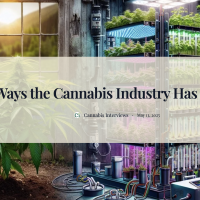Can you share what you think might happen to our healthcare system if doctors don’t start learning more about the benefits of cannabis
A Critical Crossroads of Cannabis in Medicine?
As the medical landscape evolves, the integration of cannabis into conventional treatment modalities stands at an important crossroads. The rapid destigmatization of cannabis contrasts sharply with its very slow and hesitant acceptance into mainstream medicine. The growing cannabis industry offers unprecedented therapeutic potential, yet it faces potential stagnation due to a lack of engagement and understanding within the medical community. This situation serves as a critical warning: without proactive education and adaptation by healthcare professionals, the future may hold a widening gap between patient needs and the care they receive.
Unexplored Potential: The Medical Community’s Hesitance
Imagine a future where, despite strong evidence supporting cannabis’s medical benefits, the healthcare system remains mired in outdated biases and skepticism. In such a future, the potential of cannabis for therapeutic applications remains largely unexplored, a victim of collective inertia. This scenario would represent not just a failure to seize new opportunities for patient care but a deviation from the very principles of medical practice. The echoes of these missed opportunities would reverberate through the corridors of healthcare institutions, serving as a somber reminder of the road not taken.
Bridging the Cultural Divide
The evolution of the cannabis industry brings with it a cultural shift towards greater acceptance and understanding among the general public. However, this shift places traditional medical practitioners who remain indifferent or outright hostile to cannabis education increasingly… out of touch. This divide extends beyond professional disagreements, affecting patients who feel dismissed by a system that overlooks their treatment choices. The resulting estrangement undermines the foundational trust essential to the physician-patient relationship.
The Risk of Misinformation in Self-Medication
In the void left by the medical community’s reluctance to learn, or hardly even engage with cannabis, misinformation flourishes like wildfire. Patients, seeking relief and guidance, often turn to unreliable sources, leading to a proliferation of self-medication practices devoid of professional oversight. If throwing spaghetti to the wall yields success, why wouldn’t every just go with such an approach?This trend towards self-guidance in cannabis usage introduces significant risks, as patients navigate strains, dosages, and methods of administration without medical advice, often persuaded by meaningless marketing campaigns and pseudoscientific “cannabis consultants” who boast accolades built upon their personal experience or interests in cannabis, or lack disciplined knowledge that has stood the test of meaningful challenge or rigorous experience . The public health implications of such half-truths or flat-out misinformation are far-reaching and underscore the necessity of physician involvement in cannabis education.
Ethical Considerations in Cannabis Education
The core ethical principles of medicine—beneficence, non-maleficence, autonomy, and justice—demand a reconsideration of the stance on cannabis education. Ignoring the therapeutic possibilities of cannabis not only compromises patient care but also challenges the ethical commitment to do no harm. An informed, educated approach to cannabis can enhance patient autonomy, offering choices grounded in comprehensive, compassionate care.
Envisioning a More Inclusive Healthcare Future
Avoiding the dystopian scenario of unfulfilled potential and healthcare division requires a paradigm shift in medical education and practice. This shift entails the inclusion of cannabis studies in medical curricula and the cultivation of a culture of ongoing learning and openness. Healthcare professionals need to approach cannabis with an informed, evidence-based perspective, aligning patient safety and efficacy.
The integration of cannabis into mainstream medical practice calls for collaborative efforts among researchers, clinicians, and the cannabis industry. Such partnerships can facilitate the adoption of cannabis into evidence-based care, ensuring its benefits are realized broadly within personalized medicine frameworks.
So?
The path to fully integrating cannabis into medical practice is laden with challenges but also rich with opportunity. By embracing a commitment to cannabis education, the medical community can navigate these challenges, ensuring that future healthcare models are inclusive, effective, and compassionate. The imperative to act is immediate, for the benefit of both current and future generations. Moving forward with courage, curiosity, and a dedication to patient care excellence, we can transform today’s warnings into tomorrow’s milestones in healthcare.
Historical Parallel: The Antibiotic Mismanagement Crisis
The reluctance of the medical community to fully embrace cannabis education echoes a historical oversight with far-reaching consequences: the antibiotic mismanagement crisis. For decades, antibiotics were hailed as miracle drugs, leading to their widespread use for a broad spectrum of infections, often without sufficient oversight regarding their necessity or the development of resistance. Physicians, not fully engaged with emerging research on antibiotic resistance, continued to prescribe these drugs liberally. This practice contributed to the alarming rise of antibiotic-resistant bacteria, a public health threat that endangers the effectiveness of life-saving treatments worldwide. This scenario underscores the critical need for healthcare professionals to stay informed and adapt to evolving medical knowledge, highlighting the dangers of complacency in the face of emerging health trends and scientific evidence. Just as the antibiotic resistance crisis called for a more judicious and informed approach to drug prescription, the current landscape demands a proactive and educated stance on cannabis, emphasizing the importance of continual learning and adaptation in medicine.
The Opioid Epidemic: A Cautionary Tale of Misunderstood Risks
Another poignant example of the consequences of the medical community’s disconnect from critical knowledge is the opioid epidemic. Initially, opioids were marketed and prescribed as a panacea for pain, with pharmaceutical companies downplaying the risk of addiction and overestimating their safety. Many physicians, not fully aware of the addictive nature and potential for abuse of these medications, prescribed them for chronic pain, leading to widespread misuse and a dramatic increase in addiction rates and opioid-related deaths. This crisis highlights the dire consequences of a healthcare system that fails to critically assess and adapt to the complexities of new treatments. It underscores the necessity for physicians to be well-informed and skeptical of prevailing medical trends and pharmaceutical marketing, to prevent public health disasters. Similar to the antibiotic and opioid crises, the current situation with cannabis calls for a nuanced, educated approach to ensure that its integration into medicine maximizes benefits while minimizing risks.
The Rise of Vaping and Unanticipated Health Issues
The introduction of e-cigarettes and vaping as a “safer” alternative to smoking tobacco presents yet another example where insufficient engagement and understanding among healthcare professionals led to unforeseen public health challenges. Initially touted for their potential to aid in smoking cessation without the harmful effects of traditional tobacco products, vaping devices quickly proliferated with little regulation and scant research on long-term health impacts. As these products gained popularity, especially among younger populations, reports of severe lung injuries and vaping-associated pulmonary injury (VAPI) cases began to surface. The medical community was initially unprepared to diagnose and treat these conditions, as the potential risks of vaping had not been fully communicated or understood. This scenario emphasizes the critical need for healthcare professionals to remain vigilant and informed about emerging health products and trends, particularly those that are widely adopted before their health impacts are fully understood. Like previous public health oversights, the vaping health crisis illustrates the importance of proactive education and research engagement to safeguard public health
End
In summary, this answer… which has now become a blog… underscores the imperative for the medical community to proactively embrace cannabis education, drawing parallels with historical lessons from antibiotic mismanagement, the opioid epidemic, and the rise of vaping-related health issues. Each of these examples serves as a cautionary tale of what happens when healthcare professionals are disconnected from evolving knowledge and emerging trends, leading to public health crises that could have been mitigated or avoided with more informed, critical engagement. Just as the misuse of antibiotics and opioids, and the unforeseen consequences of vaping, have highlighted the need for continual learning and adaptation in healthcare, the current landscape of cannabis medicine demands a similar approach. It is essential for physicians and healthcare providers to stay informed and actively engage with the latest research and clinical evidence surrounding cannabis to ensure its potential benefits are realized safely and effectively, thereby preventing the pitfalls experienced in past public health challenges.





